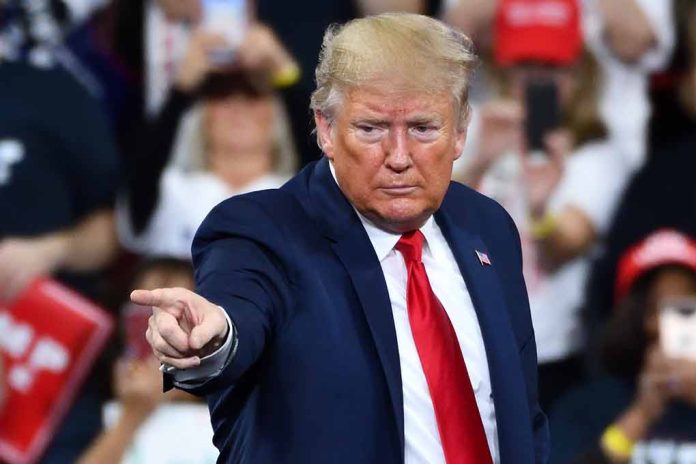
President Trump removes NSA Director General Timothy Haugh and Deputy Director Wendy Noble, raising questions about national security priorities and leadership changes at critical intelligence agencies.
Key Takeaways
- President Trump fired NSA Director Gen. Timothy Haugh, who also commanded U.S. Cyber Command, along with Deputy Director Wendy Noble, who was reassigned to the undersecretary of defense for intelligence.
- Both Haugh and Noble were career officials with decades of service spanning multiple administrations, with Haugh serving over 30 years in uniform focusing on cyber and intelligence operations.
- Congressional Democrats have expressed concern over the dismissals, with Sen. Mark Warner calling the firing “astonishing” amid ongoing cyber threats like the Salt Typhoon attack from China.
- Conservative activist Laura Loomer claimed credit for the dismissals, describing the officials as “Biden holdovers” and “disloyal to President Trump,” though the White House has not confirmed her involvement.
- The firings follow reports of other dismissals at the National Security Council and come after Elon Musk’s recent visit to the NSA where he commented about the agency needing an overhaul.
Presidential Authority Reshapes Intelligence Leadership
The Trump administration’s dismissal of General Timothy Haugh from his dual roles as NSA Director and U.S. Cyber Command chief marks a significant shake-up in America’s intelligence community. According to multiple reports first published by The Washington Post, Haugh’s firing was accompanied by the reassignment of NSA Deputy Director Wendy Noble to the office of the undersecretary of defense for intelligence. The White House National Security Council has not provided official comment on the reasons behind these personnel changes, leaving many to speculate about the strategic implications for national security operations.
General Haugh brought extensive experience to his position, with a military career spanning over three decades focused on cyber and intelligence operations. He played a crucial role in countering foreign cyber threats, including Russian interference during the 2018 midterm elections. Both Haugh and Noble were career officials who had served under both Republican and Democratic administrations, bringing institutional knowledge and continuity to critical security operations that protect American interests from evolving technological threats.
Gen. Tim Haugh, the chief of the National Security Agency, was fired at the direction of the White House, according to people familiar with the matter https://t.co/vgG9hKxYcb
— The Wall Street Journal (@WSJ) April 4, 2025
Congressional Reaction and National Security Concerns
The dismissals have prompted strong reactions from Democratic leaders of congressional intelligence committees. Representative Jim Himes expressed particular alarm at Haugh’s removal, praising the general’s leadership qualities while raising concerns about the administration’s motivations. Senior lawmakers have questioned the timing of these personnel changes, particularly as the nation faces significant cybersecurity challenges, including the recent Salt Typhoon cyberattack attributed to China that demonstrated vulnerabilities in American digital infrastructure.
Senator Mark Warner, who leads the Senate Intelligence Committee, described Haugh’s firing as “astonishing” and questioned how removing an experienced cyber commander would improve American security. Larry Pfeiffer, a former senior intelligence official, characterized the dismissals as “unprecedented,” reflecting concerns within the intelligence community about potential disruptions to operational continuity. These reactions highlight tensions between political priorities and professional expertise in managing complex security threats facing the nation.
Speculation About Influence and Future Direction
Reports have linked the NSA leadership changes to broader personnel shifts within national security circles. Senator Warner referenced claims that conservative activist Laura Loomer presented President Trump with a list of allegedly disloyal National Security Council staff members. While the president has denied Loomer’s direct involvement in staffing decisions, NBC News reported that Trump also dismissed three National Security Council officials following meetings with the activist, suggesting potential influence from outside the traditional national security establishment.
The timing of these dismissals also follows Elon Musk’s recent visit to NSA facilities, after which he commented that the agency required restructuring. This convergence of events suggests a potential realignment of intelligence priorities and leadership to better align with the administration’s vision for national security operations. The situation reflects ongoing tensions between career officials with institutional expertise and new political appointees tasked with implementing the president’s policy agenda, a dynamic that has characterized previous transitions in intelligence leadership throughout American history.
Sources:
National Security Agency Director Gen. Haugh fired, civilian deputy director reassigned
National Security Agency chief and deputy director dismissed
Trump Fires General Timothy Haugh, Head of the National Security Agency and US Cyber Command



